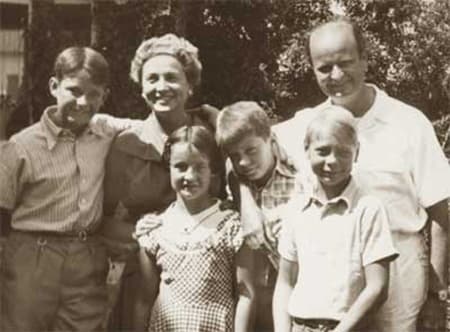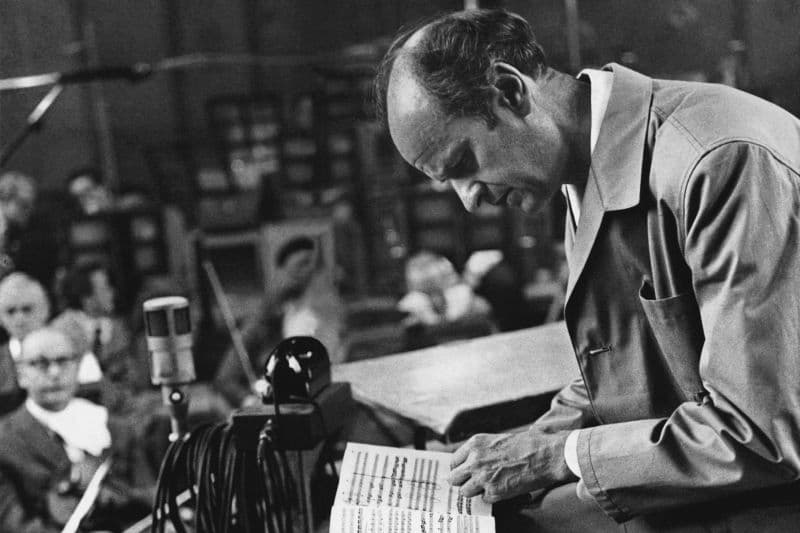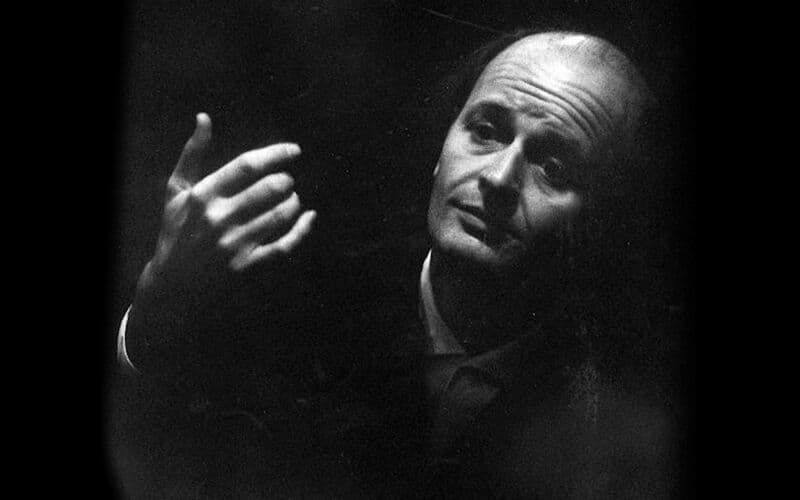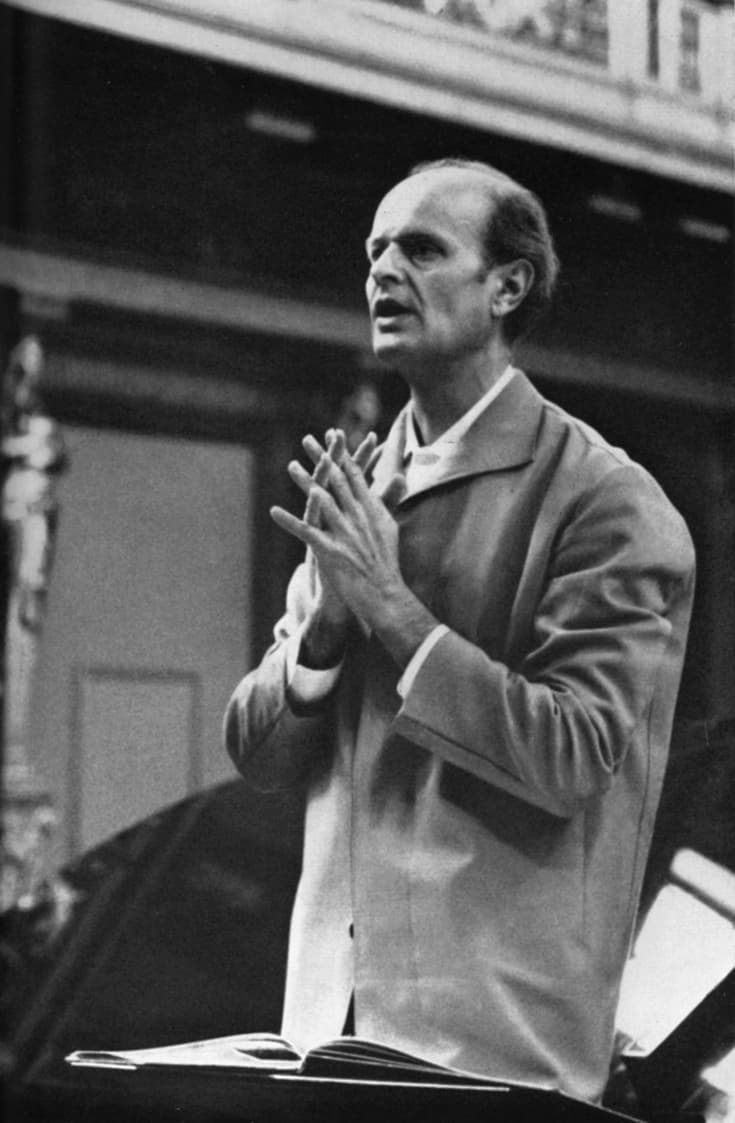The prodigiously gifted Hungarian conductor Ferenc Fricsay tragically died at the age of 48. A student of Béla Bartók, Zoltán Kodály, Ernst von Dohnányi, and Leó Weiner, Fricsay was “one of the few artists in classical music that were seemingly unable to do wrong, unable to produce a single unmusical note, unable to be wilful in ways that would detract from the music.” Conducting without a baton he “confounded the adverse critics of this technique by the extreme clarity, dynamic spirit, and precision of his performances.”
Ferenc Fricsay Conducts Beethoven’s Symphony No. 3
Ferenc Fricsay’s First Steps and His Musical Childhood

Ferenc Fricsay’s family, 1952
Ferenc Fricsay was born on 9 August in Budapest to a Jewish mother and Catholic father. He much enjoyed recalling his earliest childhood memories, which already revolved around conducting. “My father was a military band leader,” he writes, “and at one of the outdoor concerts he used to conduct on summer afternoons, I caused a minor disturbance at the age of four. I was usually sitting with my mother in the audience. That day, suddenly I disappeared from her side and walked to the orchestra, stood behind my father who was conducting, and full of devotion, imitated his movements.”
This little performance greatly amused the audience, but his father wasn’t distracted at all, as he did not even turn around. But one of the concert organizers reacted immediately, because “the piece was a serious one and the laughter rather out of place. With a fast grip he took my little arm and led me back to my mother.” I was clear that Ferenc had a natural aptitude for music, and his parents quickly decided that he should receive a musical education. When he enrolled in primary school, he started to take piano lessons. As Fricsay remembered, “three times a week my mother accompanied me to the lessons. She waited, patiently knitting, together with the other mothers, for the lesson to end.”
Wolfgang Amadeus Mozart: Sinfonia concertante in E-Flat Major, K. 297b (Hermann Tottcher, oboe; Heinrich Geuser, clarinet; Kurt Blank, horn; Johannes Zuther, bassoon; RIAS Symphony Orchestra; Ferenc Fricsay, cond.)
First time on the Podium

Ferenc Fricsay
Fricsay made his unofficial debut as an independent conductor at the age of 11. He and some fellow students decided to present a popular Latin professor with a birthday serenade performed by the grammar school orchestra. Fricsay remembers, “we got together to practise and found six violinists in our class, a cellist and two boys who were able to play the piano. However, the abilities of the orchestra members were severely limited as some couldn’t cope with more than one sharp or flat. So I chose the “Courting Dance” from the Zigeunerbaron, and we rehearsed in utter secrecy for six weeks.
On the day of the teacher’s birthday, the little nine-men orchestra waited for the classroom door to open and then played with enormous zest. “Our teacher stood with his mouth agape, full of surprise and joy. It must have been heart-warming to see small boys of 11 playing music with such enthusiasm on their own accord. Our teacher was overwhelmed and showed his gratitude by cancelling our first class. This was my first fee.”
Gottfried von Einem: Piano Concerto, Op. 20 – I. Molto moderato (Gerty Herzog, piano; Berlin Radio Symphony Orchestra; Ferenc Fricsay, cond.)
First Radio Broadcast

His father had been presenting a weekly concert on Hungarian Radio. One afternoon, the music programme was to start with the “Arrival of the Guests” from Wagner’s Tannhäuser, and the orchestra was all seated and had tuned their instruments. However, there was no sign of his father so the senior orchestra member asked him if he was ready to step in to conduct.
“Of course, I accepted with great enthusiasm. I started all nicely and in the middle of the piece the door opens, and I can still see my father in the doorway thunder-struck, seeing his son conduct in his place. The next piece he conducted himself, of course.”
After the concert, his father suddenly asked how come he had conducted in his place. Fricsay remembered saying, “Father, I wanted to save the situation. And besides, the senior orchestra member encouraged me. That’s why I did it. My father looked me straight in the eye and was silent for a while. I felt very uncomfortable. Then he said: By the way, it wasn’t bad at all.”
Richard Wagner: The Flying Dutchman (Ernst Haefliger, tenor; Josef Greindl, bass; Josef Metternich, baritone; Annelies Kupper, soprano; Sieglinde Wagner, mezzo-soprano; Wolfgang Windgassen, tenor; RIAS Chamber Chorus; RIAS Symphony Orchestra; Ferenc Fricsay, cond.)
His Legacy

In due course, Fricsay became a pivotal figure in the rebuilding of German musical life after the war. And Yehudi Menuhin claims that if he had lived longer, Fricsay would have been the first to be able to challenge Karajan’s supremacy. “He was a brilliant mind and no one, neither the audience nor the musicians could resist the strength of his conviction.”
For more of the best in classical music, sign up for our E-Newsletter
